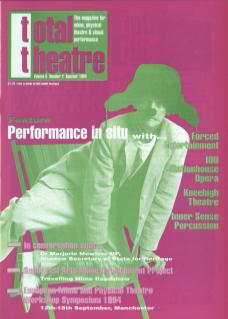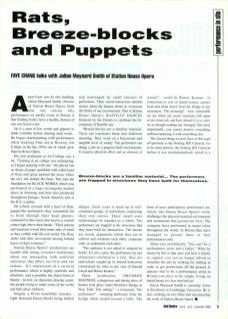Apart from cuts in arts funding, Julian Maynard Smith, director of Station House Opera, feels that one reason why performance art hardly exists in Britain is that funding bodies have a healthy distrust of non text-based work.
He is a man of few words and appears to think carefully before uttering each word... He began experimenting with performance while studying Fine Art at Hornsey Art College in the late 1970s out of which grew Station House Opera.
His first performer at Art College was a rat. ‘Training at art college was uninspiring, so I began painting with rats.’ He placed rats on sheets of paper sprinkled with a thin layer of flour and spray-painted the areas where the rat's tail shifted the flour. This laid the foundation for Black Works which was performed in a huge rectangular market place in Antwerp and then also produced throughout Europe, North America and at the ICA, London.
On a floor, covered with a layer of flour, puppet-like performers obey commands fed to them through their head phones, connected to thin wires that lead to a control centre high above their heads. ‘Their actions and reactions reveal their inner state of mind as they collide with the real world. The flour shifts with their movements leaving behind traces of their existence.’
Station House Opera's productions are loaded with strong, evocative testimonies about our interaction with artificial structures that affect our lives and our actions. It's reminiscent of a carnival performance which is highly symbolic and ritualistic, and is possibly the oldest form of theatre – no text, no characters playing a part, but people trying to make sense of the world and their place within it.
"Breeze-blocks are a familiar material... The performers are trapped in structures they have built for themselves."
Imagine a 40-ton monolithic structure – eight thousand breeze-blocks being shifted and rearranged by small clusters of performers. Their social interaction unfolds stories about the human desire to overcome the limits of our environment. This is Station House Opera's Bastille Dances financed by the French to celebrate the bicentenary of Bastille day.
‘Breeze-blocks are a familiar material. Their use translates them into different meaning. They work on a functional and tangible level of reality. The performers are doing a job in a purpose-built environment. It requires physical effort and an element of danger... Each scene is made up of self-contained groups of individuals conducting their own stories. These small scale relationships fit together as a whole. The performers are trapped in the structures that they have built for themselves. The blocks are words, arguments which they use to subvert and condemn each other, cooperate with or undermine each other.’
‘The audience is not asked to suspend its belief. It's not a play, the performers are not characters confined to a role, they are individuals caught up in absurd behaviour constrained by rules in the vein of Harold Lloyd and Buster Keaton.’
Their production, Drunken Madness, a dangerous and daring piece of theatre, took place under Brooklyn Bridge in New York. The setting? A restaurant. The performers? Swinging perilously from the bridge while seated around a table. The waiter? Could be Buster Keaton – is connected to a sort of dumb-waiter, carries food and drink down from the bridge to his customers. The meaning? How vulnerable we are when our social structures fall apart or are removed, and how absurd it is to carry on as though nothing has changed. But most importantly, you cannot destroy something without replacing it with something else.
The closest thing we now have to this type of spectacle is the Notting Hill Carnival (or to be more precise, the Notting Hill Carnival before it was institutionalised) which is a form of mass participatory performance art which, like Station House Opera's work, challenges the physical material environment and institutions that govern our lives. The company have performed in major cities throughout the world. In Britain they have managed to present three or four performances only.
Julian says nonchalantly, ‘You can't be a performance artist and a father.’ What he means by this is that once you have a family to support you can no longer afford to subsidise the arts by working for nothing in order to get productions off the ground. It appears that to be a performance artist in Britain you have to be single, living on baked beans in a low rent bed-sit.
Julian Maynard Smith is currently Artist in Residence at Cambridge University. He is also working on two films and documenting the work of Station House Opera.

